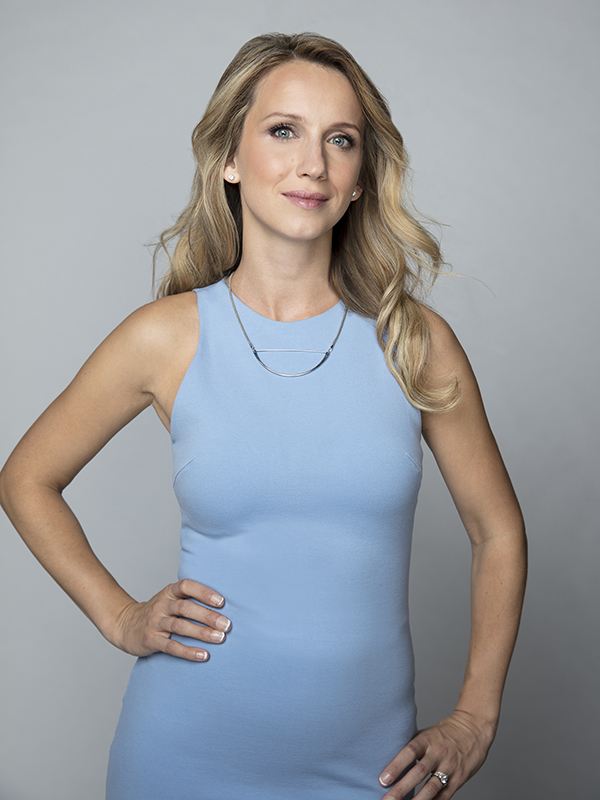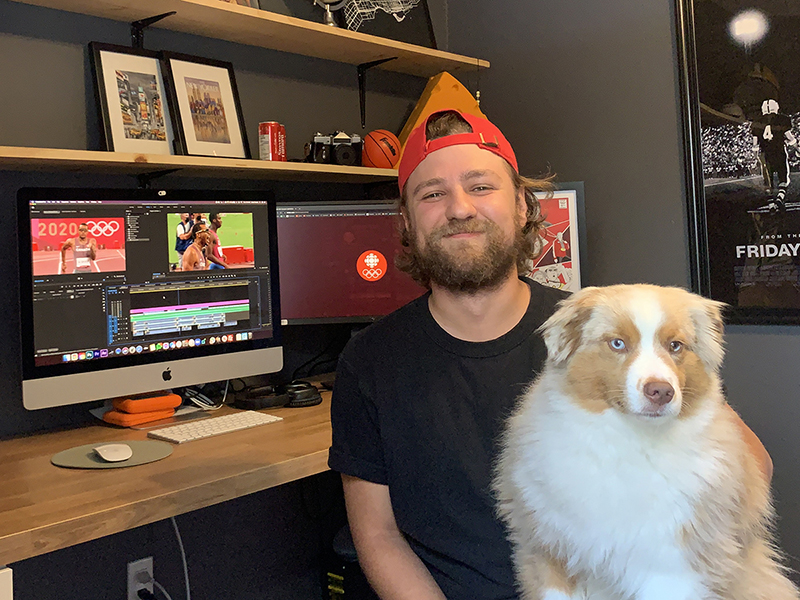Covering the Olympics
The Beijing 2022 Winter Olympics and Paralympics wrapped up this month, and a few of the School of Journalism’s alumni and faculty had it covered.
Alumni Monika Platek and Steve Tzemis, along with retired instructor Mark Bulgutch, covered the most recent and previous Olympics in their roles as journalists and producers. We talked to them about their experiences and for any advice they would give to journalism students who want to cover future Olympics.

Monika Platek
Monika Platek, a 2008 graduate of the School of Journalism, is a senior producer on CBC’s social media team. After Beijing 2022, she’s now covered six Olympic games.
"The Olympics were always my dream,” she says. “When I was a teenager, I would always watch them with my dad. I just wasn't athletically talented. So once I worked the Vancouver games, I was hooked. My life goal sort of became working the Olympics for the rest of my life. And that's kind of where I'm at."
During the 2010 Olympics, Platek traveled to Vancouver and covered the game on her own time through social media. By the London 2012 Olympics, she was officially offered a social media position to lead social coverage at CBC.
For Beijing 2022, Platek says their social team on the ground was much smaller for both the Olympics and Paralympics, so most of the team was back in Canada in either Toronto or Montreal. Because of this, her team closely watched all of their social platforms to make sure they were seeing athlete updates. “We found a system and we made it work, but it definitely wasn't the way we were used to covering the Olympics, pre-pandemic," she says. “We really relied on athletes sharing their experience.”
She adds that working from home presented its own challenges, but the social media team got into a rhythm after Tokyo 2020, which actually took place in 2021 due to the pandemic.
"It was unprecedented to have two Olympics this close together, but at the same time, we took what we learned from Tokyo 2020 and put it right into Beijing 2022 six months later,” she says.
She says that they also took what worked for the Olympics and applied that to the Paralympic games. "The Paralympic athletes come with their own stories and their own journeys, and so we honour that,” she says.“We found that what works so wonderfully for the Olympics and the Paralympics are those human interest stories. The stories that go beyond sports."
Platek finds that working on the Olympics is within reach for students and young journalists. She suggests reaching out early to the sports journalists that will be covering the Olympics, as the athletes they cover in year-round sports are going to be in the Paris 2024 summer Olympics.
It’s important to Platek that more women work in sports and on projects like the Olympics. “We're always striving to tell more women-focused stories and really provide Canadians with the same amount of men's and women's sports stories and perspectives.”

Steve Tzemis
Steve Tzemis, a 2015 graduate of the School of Journalism, is a video producer and editor for CBC Olympics and CBC Sports. Beijing 2022 was his fourth Olympic games and the second in which he’s worked in video.
"Two Olympics in six months is tiring, but when you're focusing on Canadian athletes and you're working in a team that's busy all day for 10 to 12 hours, it’s a blast,” he says.
He’s also covered the Paralympic games in Beijing. While he says the CBC team isn’t as big as the Olympic team because there are less events and athletes, he’ll still be cutting videos for when Canadians are winning medals or if there are any heartwarming or viral moments.
At CBC Sports, he says they try to focus on the athletes that are hopefully going to be winning medals in two or four years during the next Olympic games. "Outside of the Olympics, it's all about prepping for the Olympics,” he says, as his focus now shifts to Paris 2024.
During his final year at the School of Journalism, he says one of his professors connected him with someone who worked at CBC, which led him to doing a short contract with the CBC team for the 2015 PanAm Games in Toronto. "I've just stuck on since then," he says.
During a second-year video production class in journalism school, he says he fell in love with the video aspect and being creative from an editing standpoint. "It feels a little bit like being an artist, which is fun,” he says. “I focus more on features at CBC, so I get to take a little bit more time when I'm editing and be a little bit more creative.”
Tzemis says there are many roles inside CBC during the Olympics, many of which are hired for the event. He adds that many continue working in the sports department once the Olympics wrap up.
"Being able to write and have a journalistic mind and being able to know what's a story helps when you're trying to break into sports media,” he says. “There are so many people that want to get into sports, so my advice would be to focus more on making sure you're a good journalist."

Mark Bulgutch
Mark Bulgutch is a current contract lecturer at the School of Journalism and has taught at the school since 1987. He is a former CBC journalist of 40 years and has now covered 10 Olympic games for CBC, excluding the London 2012 Olympics with CTV.
The 1976 Montreal summer Olympics were his first games. He was just out of university and doing a local reporter job with CBC Montreal. On the opening day of the Olympics, he says his assignment was to cover the crowds outside of the Olympic stadium. While waiting outside, he was invited into the ceremony free-of-charge by someone on the games’ organizing committee. And so he got to watch the opening ceremony in his hometown for the first games he ever covered.
While he generally enjoyed covering the Olympics, he adds that it's not as glamorous as it seems. "It's a grind because it's still working,” he says. “It's a long, long day, almost always.”
Bulgutch says the way the Olympics are covered has changed over the years, especially through the use of technology. Back then, he says CBC used to send hundreds of people between the English and French networks to cover the games, including technical and production staff alongside journalists. Now, he says video can be brought back to Toronto from cameras at the event, which drastically reduces the number of people who have to be there in person.
The advice Bulgutch gives to young journalists is to not get hung up on the sport or the statistics, but to get hung up on the stories."Tell stories that people can relate to. Those are the stories you tell at the Olympics.”
"I think it's a mistake to think of the Olympics as a sports event,” he says. “Journalistically, they are not. What's important to the Olympics are the human stories, because they are watched by many more people that don’t normally watch a sporting event. The trick to an Olympics is to make the athletes interesting.”
